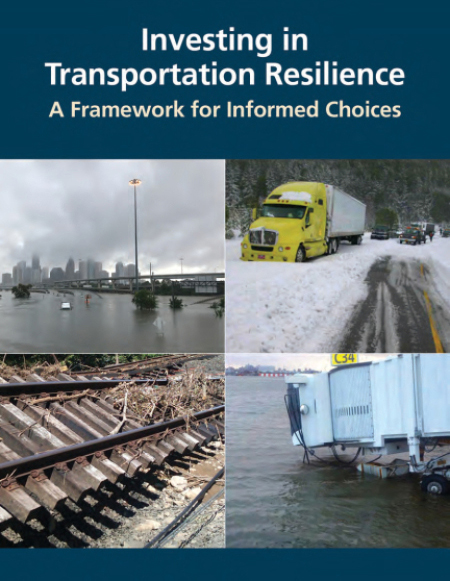
To ensure routine and deliberate attention to resilience in transportation investments, Congress should consider requiring all projects that are candidates for federal funding undergo resilience assessments to account for natural hazards, according to a new National Academies of Sciences, Engineering, and Medicine report. Despite significant progress made over the last decade in integrating resilience criteria into transportation decision-making, authors find that resilience is measured and weighed inconsistently, even when it is a prominent factor in the investment planning process.
“Investing in Transportation Resilience: A Framework for Informed Choices” makes the case for the U.S. Department of Transportation to promote the inclusion of resilience benefits into its benefit-cost analysis (BCA) for project justifications. The report also recommends that resilience be measured and assessed using an analytic framework that incorporates detailed inventories of existing and planned assets, such as roads, runways, bridges, docks, and rail lines; assessments of the characteristics and likelihood of future natural hazards; and, predictions of the vulnerability of the assets and their critical functions to those hazards.
“Storms, floods, droughts, and other natural hazards are combining with sea level rise to disrupt the functioning of the nation’s transportations systems,” says Civil and Environmental Engineering Professor Joseph Schofer, associate dean at the Northwestern University Robert R. McCormick School of Engineering and Applied Science and chair of the committee that wrote the report. “Investing in resilience will require us to make carefully considered choices about how we spend money today to generate benefits that may not be realized until long into the future.”
To guarantee that resilience is a routine and deliberate element of selecting transportation investments, the report recommends that Congress consider a requirement that all federally funded projects involving long-lived assets undergo well-defined resilience assessments that account for the risks from natural disasters and changing climate conditions. Assessments should be integrated into environmental impact statements or other evaluation efforts, such as during BCA. The Office of the Secretary of Transportation (OST) should also promote the use of BCA that take into account resilience returns.
Additionally, the report recommends that Congress should direct and provide resources for the OST to conduct a study to define the types of data that transportation agencies need for resilience analysis, identify potential sources for the data, and advise on possible means for making it more suitable for the analysis.
Undertaken by the Transportation Resilience Metrics Committee, “Investing in Transportation Resilience” was sponsored by the U.S. Department of Transportation. The National Academies are private, nonprofit institutions that provide independent, objective analysis and advice to the nation to solve complex problems and inform public policy decisions related to science, technology, and medicine.